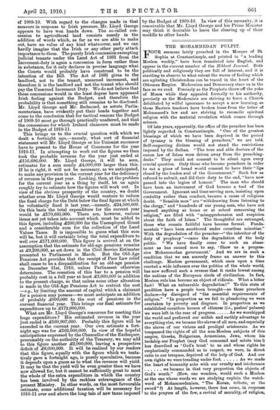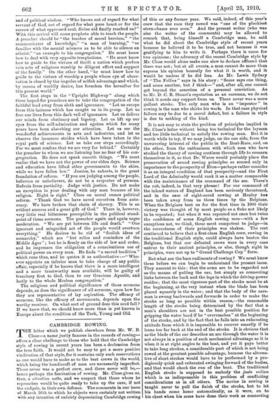THE MOHAMMEDAN PULPIT. F OUR sermons lately preached in the Mosque
of St, Sophia at Constantinople, and printed in " a leading Moslem weekly," have been translated into English, and appear in the current number of the Hibbert Journal. Both politically and religiously they are full of interest, and it is startling to observe to what extent the waves of feeling which are agitating Christendom can be traced in the heart of the Ottoman Empire. Modernism and Democracy stare us in the face as we read. Precisely as the Prophets threw off the yoke of Moses while they appealed formally to his authority, precisely as the Modernists are striving to force a Church debilitated by wilful ignorance to accept a new learning, so these Eastern teachers have broken loose from the letter of Mohammed's law and are striving to reconcile spiritual religion with the material revelation which comes through science.
Of late years, apparently, the office of the preacher has been lightly regarded in Constantinople. " One of the greatest blessings of which we have been deprived in the period of tyranny is the blessing of preachers," we are told. Self-respecting divines would not stand the restrictions imposed by the Sultan. " The true and able doctors of the canon law of Islam were driven away from the preaching- desks." They could not consent to be silent upon every crucial question. Only those who became preachers in order to eat a piece of bread would consent to have their " lips closed by the leaden seal of the Government." Such few as refused to submit, and did their duty to the end, " have now passed into the legion of honour." The man who should have been an instrument of God became a tool of the Government. Ignorant and time-serving men, insisting upon credulity rather than conduct, became a cause of religious doubt. " Sensible men " are " withdrawing from listening to the clergy," and " hundreds of our young men, who have not learned anything at home or at school concerning the religion," are filled with "misapprehension and suspicion about the faith of Islam." The thoughtful are estranged, those who remain faithful have become formal. Funda- mentals " have been smothered under countless minutiae." With the degradation of the preacher—" the inheritor of the duty of prophecy "—came the degradation of the body politic. " We have finally come to such an abase- ment as has caused men to say, Show us a progres- sive Mohammedan government.' And we are in such a condition that we can scarcely frame an answer to this challenge. Moslem government, which once upon a time exerted a wide influence over the politics of the whole world, has now suffered such a reverse that it ranks lowest among the nations of the European circle of civilisation. In fact, Moslem rule has become an object of ridicule. What a bitter fact! What an unbearable degradation!" To this state of perdition have a people been brought—so these preachers declare—by disregard of " the essential requirements of religion." "In proportion as we fell to plundering we were overtaken by poverty and disgrace. In proportion as we established countless houses of idleness (i.e., pashas' palaces) we were left in the rear of progress As we worshipped the world and preferred our selfish and earthly advantage to everything else, we became the slaves of all men, and especially the slaves of our vicious and prodigal aristocrats. As we trespassed the rights of all the non-Moslem subjects of this empire, Greeks, Bulgarians, Armenians, Jews, whom his lordship our Prophet (may God commend and salute him !) has described as God's trust' to ns and whose rights he emphatically commanded us to respect, we were, in direct ratio to our trespass, deprived of the help of God. And our own rights we were treading under foot As we made the heart of humanity ache with our cruelty and intolerance we became in that very proportion the objects of God's wrath." (How, one wonders, would such a Moslem as the one whose words we are studying explain the watch- word of Mohammedanism, " The Koran, tribute, or the sword"?) At length, however, there has come, in response to the prayers of the few, a revival of morality, of religion,
and of political wisdom. "Who knows out of regard for what servant of God, out of regard for what pure heart or for the sorrow of what oppressed soul, divine aid finally reached us?" With this revival will come prophets able to teach the people. A preacher should be " the teacher of moral heroism," " the communicator of knowledge," "a man of learning," "so familiar with the mental sciences as to be able to silence an atheist," "an example to his congregation." He must know how to deal with very opposite temptations. "He must know how to guide to the virtues of thrift a nation which prefers vain acts of religious worship to diligent effort and support of the family." On the other hand, "he must know how to guide to the virtues of worship a people whose eye of obser- vation is closed by the impulse of selfish advantage and which, by reason of worldly desire, has forsaken the hereafter for this present world."
The first steps in the "Upright Highway" along which these hoped-for preachers are to take the congregation of the faithful lead away from sloth and ignorance. " Let us escape from this laziness which has caught us in its grasp. Let us free our lives from this dark veil of ignorance. Let us deliver our minds from obstinacy and bigotry. Let us lift up our eyes from the self-admiration and egoism which for many years have been absorbing our attention. Let us see the wonderful achievements in arts and industries, and let us observe the immense strides which have been taken in the royal path of science. Let us take our steps accordingly. For we must confess that we are very far behind." Certainly the preacher to whom we are listening has no fear of his con- gregration. He does not speak smooth things. " We must realise that we have not the power of our olden days. Science and education have lifted other governments to the skies, while we have fallen low." Justice, he exhorts, is the great foundation of reform. "If you are judging among the people, believers or unbelievers, do not be a respecter of persons. Refrain from partiality. Judge with justice. Do not make an exception in your dealing with any man because of his religion. Right is right." Close on moral comes political reform. " Thank God we have saved ourselves from auto- cracy. We have broken that chain of slavery. This is an evident success and a great gift of God." There is, however, very little real bitterness perceptible in the political stand- point of these sermons. The preacher again and again urges moderation. " We are yet between life and death." " One ignorant and misguided act of the people would overturn everything." He desires to be rid of "foolish ideas of monarchy," which are "but relics and reminders of the Middle Ages " ; but he is firmly on the side of law and order, and he impresses the obligation of a conscientious use of political power on every man. He finds " a sacred tradition " which runs thus, and he quotes it as authoritative :—" Who- ever appoints an inferior man to take charge of any public affair, especially if he knows that there is a more intelligent and a more trustworthy man available, will be guilty of treachery first to God, then to our Gracious Apostle, and lastly to the whole Moslem congregation."
The religious and political significance of these sermons depends, as does the significance of all sermons, upon how far they are representative of lay aspiration. The efficacy of sermons, like the efficacy of sacraments, depends upon the worthy receiver. On what sort of ground does this seed fall P If we knew that, we should know more than is yet known in Europe about the condition of the Turk, Young and Old.















































 Previous page
Previous page